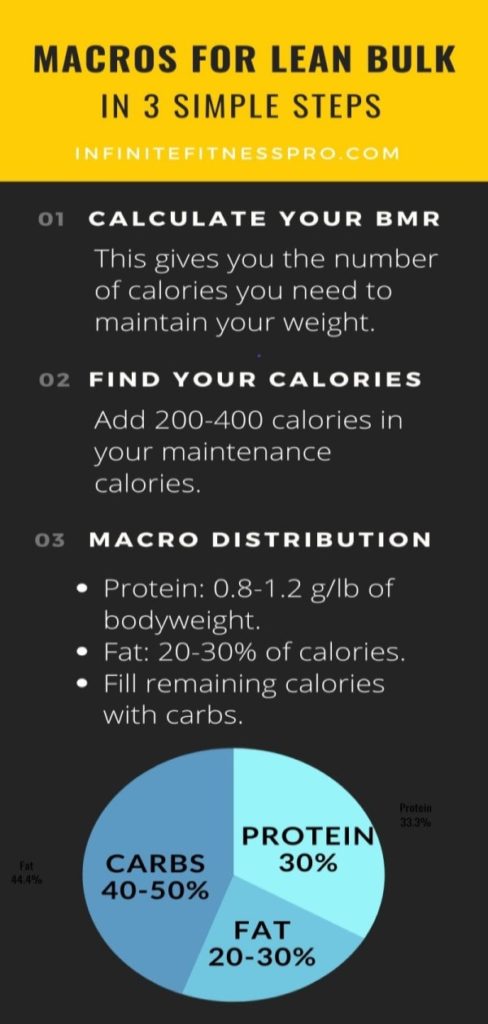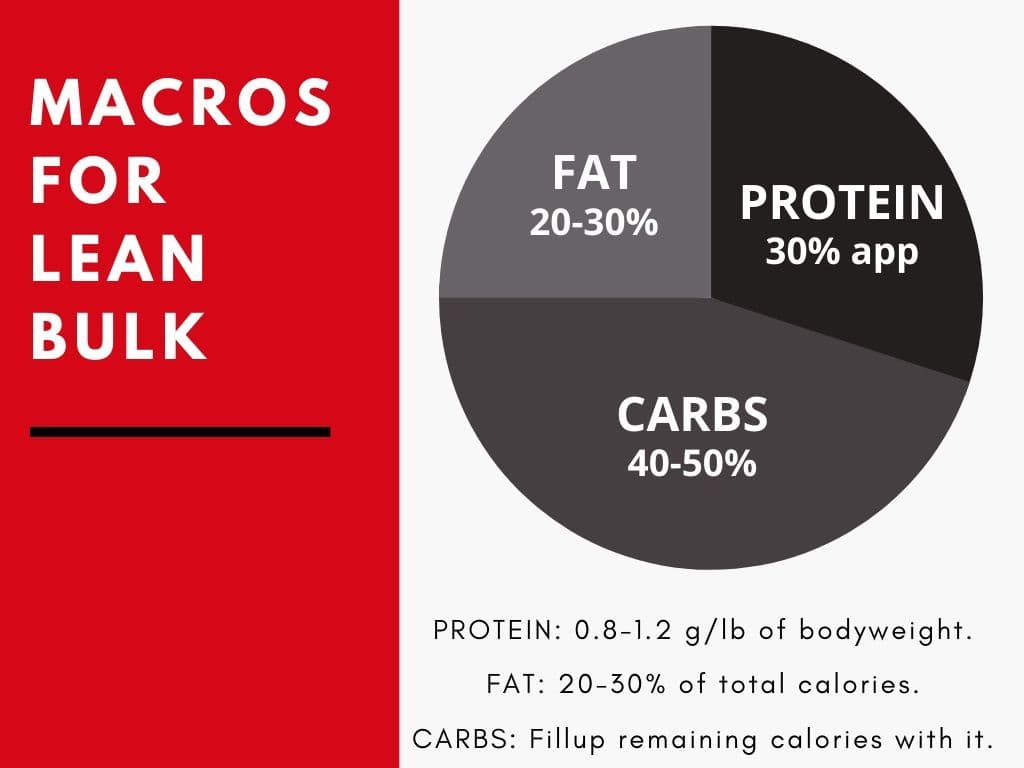Do you want to gain lean muscle mass but are confused about your nutrition for a lean bulk? Don’t worry, here’s the complete guide explaining how can you calculate your macros for lean bulk.
No matter how hard you push in your workouts, if your nutrition is not up to the mark you won’t get your dream physique. So let’s get started.
What is Bulking?
There are mainly two phases in bodybuilding, bulking and cutting.
In the cutting phase, the goal is to lose weight or fat while preserving the maximum muscle mass possible to get a lean and ripped physique. For that, you need to take a calorie deficit diet.
In bulk, the goal is to gain weight, primarily muscle mass. For that, you need to take a caloric surplus diet – eating more calories than you need.
How Lean Bulk is different from Bulking?
Lean bulk is more challenging than bulking. In lean bulking, the primary goal is to gain muscle mass while minimizing fat gain. You can also call it lean muscle gain.
For lean bulking, you have to push harder in the gym and have to follow a strict diet. An intense workout backed with proper nutrition only leads to a lean muscular physique.
Macros for Lean Bulk in 3 simple steps
To build a lean physique, it’s good to have a qualified fitness trainer. But don’t worry if you don’t have one, this article will give you a structure to plan your macros for lean bulk in 3 simple steps.

Step 1 – Calculate your BMR
Basal Metabolic Rate (BMR) gives you a rough estimate of the number of calories you need to consume to maintain your weight.
To calculate your BMR, just type the BMR calculator on google or click on this link to check.
This will give you your calorie requirement to maintain your current body weight based on your activity level.
You can also calculate this manually by using the Harris-Benedict equation.
Step 2 – Find your calories for a lean bulk
As you have your maintenance calories, now you need to find your calorie requirement to gain lean muscle mass.
To gain muscle mass, you have to consume more calories than the requirement. But eating too many extra calories (more than 500 calories) may be bad for you.
Researches show that more calories don’t mean more growth.
Since your body has a limit to the rate of muscle growth, the rest of the excess calories would be stored as fat in your body.
Hence, just add 200-400 calories in your maintenance number you find out through the BMR calculator in step 1.
You can also find your daily calories manually. Multiply your body weight (in pounds) by 15 and add 200-400 calories to it. This should be your daily calorie intake for lean bulking.
Note: If you’re a beginner, you can be in the higher range (i.e, 400 calorie surplus). Whereas for intermediate and advanced lifters, stick to the lower range (i.e, 200 calorie surplus).
Step 3 – Adjust your macronutrients

Now, this is the final and most important step to finding macros for lean bulk. Consuming enough calories is not enough unless your macronutrient (protein, carbohydrates, and fat) ratio is not perfect.
Let’s set them up one by one.
Protein for lean bulking
Protein is the building block of muscle. Hence it is necessary to consume enough protein to build muscle tissue. But again, more is not necessarily better. You have to eat in an optimal range to maximize muscle hypertrophy and recovery.
So how much protein do you need for lean bulking? According to a meta-analysis published in the Journal of Sports Medicine,
Consuming 0.8-1.2 grams of protein per lb of body weight is optimal for muscle growth while lean bulk.
Here are the 13 Best Foods for Lean Muscle Gain. Check it out.
Carbs and Fats
You need enough carbs to fuel your workouts in the gym and boost your performance. Healthy fats are also important for joint health, brain health, hormones, and some other essential body functions.
Now the question is how much carbs and fats do you need while lean bulking?
First, estimate your fat intake
The general recommendation for fat intake while lean muscle gain is about 20-30% of your daily calorie intake.
Example: if you need 3000 calories per day for a lean bulk, taking a moderate amount of fat means –
3000 x 0.25 = 750 calories from fat
Now 1 gram of fat contains 9 calories so your fat intake would be
750/9 = 83 grams of fat
Make sure to get most of your fat from healthy sources like egg yolks, flax seeds, chia seeds, tofu, coconut oil, avocados, peanuts, almonds, fatty fish, etc. Try to avoid saturated fatty acids as much as you can.
For carbohydrates:
Now fill up the remaining calories with carbs.
Like after subtracting the calories from proteins and fats you are left with 1200 calories. So your carbohydrates requirement is 300 grams per day as 1 gram of carbs contains 4 calories.
Remember, all carbs are not the same. Most of the time eat complex carbohydrates only – oats, whole wheat bread, whole wheat pasts, brown rice, sweet potato, etc. The best time to eat simple carbs is before and after your workout.
A sample macro distribution for a lean bulk
Here’s an example of explaining how to calculate your macros for lean bulk in the simplest way.
1. BMR: Let’s say Alex weighs 160 lbs and after calculating his BMR in step 1, his daily maintenance calories are 2200.
2. Calories: Alex is an intermediate lifter and has a decent amount of muscle mass hence, having a 300 calorie surplus. So his daily calorie need for lean bulk is 2500.
3. Macros: Now for macro distribution, first calculate protein:
As an intermediate, Alex is taking 1 gram protein per lb of bodyweight i.e, 160 lb x 1 = 160 grams of protein.
He decided to take 30% fat so: 2500 calories x 30% = 750 fat calories / 9 = 83 grams of fat.
Now for carbs,
daily calorie requirement – calories from proteins and fats = calories from carbs i.e,
2500 calories – (160 g of protein x 4) – (83 g of fat x 9) = 1110 carb calories / 4 =278 grams of carbs / day.
How To Train For Lean Muscle Gain?
In bodybuilding, training and nutrition go hand in hand. So along with setting up your macros for a lean bulk, you have to plan your workout too.
Here are some tips regarding a lean bulk workout plan:
Training protocol: Do weight training for about 5-6 days a week and focus on increasing strength and hypertrophy.
Rest and recovery: Take 1-2 minute rest in between the sets and try to finish your workout within an hour.
Rep range: Do most of your sets in a lower rep range (about 6-12 reps/set). Several studies show that this is the best rep range for hypertrophy.
Training frequency: Training each muscle twice a week can give you the best muscle-building results.
Cardio: Add some cardio to your routine but avoid too much of it. It will help in shedding some extra fat that you may gain and aids in giving you a lean physique.
Make sure to not do cardio before weights. Do it after weight training or in a different session altogether.
Macros for Lean Bulk: SUMMARY
So this was a science-based article explaining how to calculate macros for a lean bulk. I tried to explain it in the simplest way possible. Here’s the takeaway:
To gain lean muscle mass (minimizing fat and maximizing muscle gain), take a slight surplus of about 300 calories.
Try to eat clean. Take most of the calories from healthy food sources.
Fill up those calories with 0.8-1.2 gram/lb body weight of protein, 20-30% fat and remaining carbs.
FAQs
For building lean muscle mass, you have to maximize muscle gain while minimizing fat gain. The best macro ratio you can start your lean bulk journey would be around 30% protein, 20-30% fat, and 40-50% carbs. However, you can vary the proportions if you’re not getting the required results.
To find the calories you need to gain lean muscle mass, first, calculate your BMR (basal metabolic rate). This gives you the calories you need to maintain your current weight. Take about 300-500 more calories than that to gain lean muscle mass.
Well, it is not an easy task but you can try to gain maximum muscle mass while getting minimum fat. Just take 300 extra calories than your BMR, cut refined sugar and reduce simple carbs as low as possible, and do intense weight training along with some HIIT.
Thanks for reading this far. I hope you like the article and learned something from this.
If you have any queries related to fitness, just leave a comment below.



